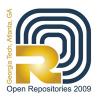news
Georgia Tech Hosts Open Repositories Conference
Primary tabs
Georgia Tech and its Library and Information Center will play host to representatives from across the globe beginning May 18. Attendees will convene for four days at the Global Learning and Conference Center and the Georgia Tech Hotel for the 4th International Conference on Open Repositories.
The conference is for users of open-source repository platforms, which manage and archive increasing amounts of digital data. Many attending the conference are affiliated with universities, libraries, national archives and research laboratories. Library Associate Director Tyler Walters-chair of the conference's host organizing committee-says he aims to bring this community together to discuss developing technologies, in addition to theoretical, practical and strategic issues.
Creative Commons' Vice President of Science John Wilbanks presents the keynote speech, "Locks and Gears: Digital Repositories and the Digital Commons." Conference organizers will present five concurrent workshops, ranging from cloud computing storage and new repository tools from DSpace, Microsoft and VTLS to the implementation and applications of SWORD (Simple Web-service Offering Repository Deposit). "Many of these tools were developed to deal with managing the 'lifecycle' of a digital objects," Walters said. "The conference helps users understand and work through how the different repositories interact with each other and with researchers."
Representatives from NASA, the National Science Foundation and other national archives and research libraries will be at the conference. "The conference is both for the technologists creating these tools and repositories, and also for the archivists, librarians and repository managers," Walters said. "It's an opportunity to show new technology, and for managers of the technologies to speak to those who create it." Major conference sponsors include Sun Microsystems, Microsoft Research, United Kingdom—based JISC (Joint Information Systems Committee), the National Science Foundation, the Institute of Museum and Library Services and the Library of Congress.
Walters and the steering committee established the conference format and the program, as well as secured the more than 80 speakers and panelists. So far, roughly 300 people have registered, about half of whom are from outside the United States. "The conference is about communicating with people and sharing knowledge gained about these systems for managing scholarly and research information-which is the core mission for any university," Walters said.
Several on-campus groups interested in the conference include researchers with the College of Computing, which partners with the National Science Foundation's National Center for Atmospheric Research (NCAR). The center uses a program called Earth System Curator, which organizes and stores large amounts of atmospheric data.
"Open repositories are critical for disseminating information of all kinds-scientific, technological and cultural-to scholars, students and the general public," said Dean of Libraries Catherine Murray-Rust. "Research libraries in this complex information environment are defining their roles to focus on delivery and preservation of electronic sources though such services as open repositories.
"This gathering of people from all over the world who are advocates for and managers of open repositories will add value to what libraries are trying to do and will enhance both the tools and services open repositories provide. It is an honor for Georgia Tech and the Library to be the host for this meeting."
SMARTech, Tech's own institutional repository, will be four years old in August, Walters said. The seventh largest repository in the United States-and 30th internationally-SMARTech contains electronic theses and dissertations, conference papers, white papers, working papers and archived Web pages. Walters says that SMARTech's current storage of nearly five terabytes could easily double in the next year.
"Most of these software repositories manage digital content for governments and universities," he said. "While research libraries still work on acquisitions and building library collections, today we are working more with new technology and directly with our faculty to manage the research data and information they create. And we work a lot more internationally than ever before. It's getting to be a small world."
The past three conferences have been held in Sydney, Australia, San Antonio and in Southampton, United Kingdom. Walters has been working on the event for roughly 18 months. While he says it's a lot of work to organize a conference of this scope, there weren't a lot of hurdles to holding the event here. "People recognized the Tech name, and getting to Atlanta is fairly easy."
Groups
Status
- Workflow status: Published
- Created by: Robert Nesmith
- Created: 05/11/2009
- Modified By: Fletcher Moore
- Modified: 10/07/2016
Keywords
User Data

